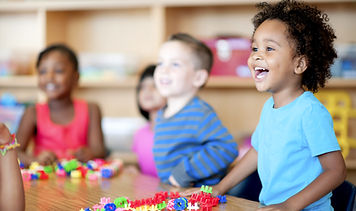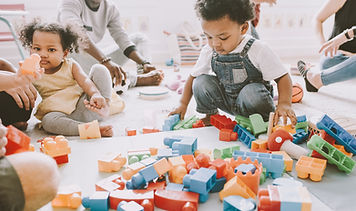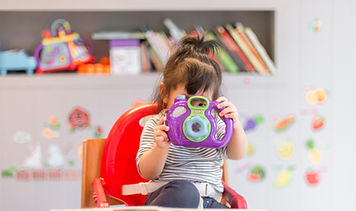
The Early Years Foundation Stage (EYFS)
The Early Years Foundation Stage (EYFS) 2021 is a statutory framework in England that sets the standards for the learning, development, and care of children from birth to five years old. It promotes teaching and learning to ensure children’s ‘school readiness’ and gives children the broad range of knowledge and skills that provide the right foundation for good future progress through school and life.
There are seven areas of learning and development that must shape educational programmes in early years settings. All areas of learning and development are important and inter-connected.

These are the prime areas:
• communication and language
• physical development
• personal, social and emotional development
The specific areas are:
• literacy
• mathematics
• understanding the world
• expressive arts and design
Birth to five matters
(non-statutory guidance for the Early Years Foundation Stage)
Birth to 5 Matters provides comprehensive guidance, drawing on previous guidance for the Early Years Foundation Stage (EYFS) which has been updated in order to reflect recent research, to meet the needs of practitioners, to respond to current issues in society, to meet the needs of children today and to lay a strong foundation for their futures.

Healthy Packed Lunch Bags
The EYFS 2021 requires early years providers to promote healthy eating and provide children with nutritious food and drink. This includes providing meals and snacks that meet nutritional guidelines and encouraging children to try a variety of healthy foods.
Providers must also support parents and carers to make healthy food choices for their children. Supporting children to understand physical health and nutritional needs is important in an early year’s setting because it helps to establish healthy habits that can last a lifetime. In our setting practitioners provide children with age-appropriate information about healthy eating and physical activity.
This includes reading books about healthy foods, teaching children about the food groups, and explaining the benefits of physical activity. Children take part in preparing their own healthy snacks at nursery and have an input in deciding what the menus will be. This includes tasting different fruits and vegetables, smelling herbs and spices, and feeling the textures of different foods from other cultures.
Our staff provide children with hands-on experiences that allow them to explore healthy foods and learn about where they come from. We grow vegetables in our garden, visit a local farm and go to the fruit and veg shop and the local supermarket for groceries and participate in cooking activities. MORE INFORMATION
OUTDOOR PLAY
We access outdoors every session; and all children are encouraged to take part in outdoor play, in all weathers including rain, snow and slight winds. The only time outdoor play will not be accessed is in extreme weather conditions. We do need keep children indoors if they have childhood ailments as we are aware that fresh air will reduce the spread of infection and is likely to improve symptoms.
Outdoor Play

The EYFS 2021 includes requirements related to physical development and healthy eating. This requires early years providers to support children's physical development by providing opportunities for active play and movement. This includes offering a range of physical activities, such as outdoor play, dance, and games, and encouraging children to develop their gross and fine motor skills. Providers must also ensure that the environment is safe and suitable for physical activity, ensure that children have opportunities to develop their gross and fine motor skills, including hand-eye coordination and balance, offer a range of physical activities that are appropriate for each child's age and stage of development, encourage children to be active and provide opportunities for regular physical activity throughout the day.
Key Person
Is defined as the named member of staff assigned to an individual child who would support their development and act as the key point of contact with parents. The role of the key person includes: - helping the child to become familiar with the provision and to feel confident and safe in it.
Each of our children have their own 'Key Person'. This is a named member of staff assigned to each individual child who supports their development and act as the key point of contact with parents.
A key person is responsible for helping the child to become familiar with the nursery and to feel confident and safe whilst with us.

The Curriculum
What we want the children to learn
Our early years curriculum is designed to provide a comprehensive and holistic approach to learning that nurtures and supports the development of the whole child. The curriculum is centred around the seven areas of learning as outlined in the Early Years Foundation Stage (EYFS) framework, and aims to promote children's personal, social, emotional, and academic growth through engaging and meaningful experiences. Our curriculum statement is as follows: We believe that every child is unique, and we strive to provide a learning environment that is inclusive, supportive, and responsive to each child's individual needs and interests. Our curriculum is designed to promote a balance of play-based and adult-led learning experiences that enable children to explore, discover, and learn in a safe and stimulating environment.
Our seven areas of learning are:

Communication and Language
We provide opportunities for children to develop their communication skills through speaking, listening, and interacting with others. We support children in developing their vocabulary and confidence in expressing themselves.
Physical Development:
We promote physical development through a range of activities that enable children to develop their coordination, balance, and fine and gross motor skills. We encourage children to be active and to explore the world around them through movement and play.


Personal, social, and Emotional Development:
We support children in developing a positive sense of self and in building positive relationships with others. We promote children's emotional well-being and help them to develop their social skills, including sharing, taking turns, and collaborating with others.
Literacy:
We provide a range of literacy experiences that enable children to develop their reading, writing, and comprehension skills. We support children in developing a love of books and literature and encourage them to explore different forms of text.


Mathematics:
We provide a range of experiences that enable children to develop their mathematical skills, including counting, sorting, and problem-solving. We support children in developing a solid foundation of mathematical concepts and vocabulary.
Understanding the World:
We encourage children to explore and make sense of the world around them through a range of experiences that enable them to learn about people, places, and things. We support children in developing their understanding of different cultures, traditions, and ways of life.


Expressive Arts and Design:
We provide a range of creative experiences that enable children to express themselves through art, music, and movement. We support children in developing their creativity and imagination and encourage them to explore different forms of expression.
.png)
